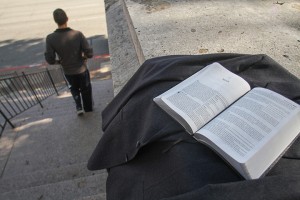
By Jon Platt
Reporter
Professors and staff members do not see the previous 20 years of denominational drift among students as a bad thing.
“The fact that we are a Baptist university but have open arms for people of any faith to come experience the excellent education available here shows that were are very secure in what we offer,” said Paula Marshall, an academic adviser. “We are confident in what we offer. We are hopeful in what we offer: that we can impact our students. That we can impact all of our students, no matter what their background.”
Marshall, who came to Baylor as a student in 1974, has observed the changes in student faith since taking her post as an adviser in 2008.
Marshall said she remembers a time when almost everybody on campus was Baptist and students did not attend Wednesday night religious gatherings at churches, but instead came to an on-campus event called Serendipity. This weekly event invited students, faculty and staff to gather alongside each other and worship on campus. Marshall said she thought it to be a voluntary form of chapel. In the ’70s, Serendipity was the place to be, she said.
“Those days are long gone,” Marshall said.
Kay Mueller, a senior lecturer of sociology, said she is confident in where Baylor and students are headed, regardless of the looming reports by statistician research groups.
In early 2014, the Barna Research Group, a faith-focused research and resource company, released a list of trends in religion. Through an analysis of widely collected and deeply researched data, the research group found that many people are beginning to associate matters of faith with the prefix “post.” Post-Christian, post-denominational, post-evangelical and post-religious were all used as examples to describe the trend.
Sociological trends such as what Barna presented are important factors to watch at Baylor, a university established in Christian tradition, evangelicalism and religious concern. These trends determine the university’s future in a “post” society.
Mueller said she doesn’t see the future ahead of the university as a depressing road.
“Our students aren’t losing their faith,” Mueller said. “They’re reinventing it. Traditional Baptist churches, like Seventh and James, are not having as many Baylor students while students are here. That’s interesting.”
Mueller said she began to notice a shift in students’ faith when traditional churches, such as Seventh and James Baptist Church, began to see a loss in numbers and newer, non-denominationally associated churches, such as Antioch Community Church, began to grow. It was evident to her, she said, that faith was being redefined and a new breed of student was coming because of the location students were meeting to worship.
“Seventh and James is on campus,” she said. “You don’t have to get in a car to get there. But, you have to drive across town to attend Antioch. That’s an interesting shift to see happen.”
Marshall said she too has noticed the drift from a “traditional” Baylor student.
“There’s a greater diversity on campus now than there ever has been before,” Marshall said. “It’s apparent in, but not limited to, our denominational breadth.”
While Marshall does see the open-door policy of Baylor as a great step forward, she said she is also nostalgic of her days as a student and the traditions she participated in with fellow Bears.
“It’s curious to me that we’re a Baptist university, but we no longer have a Baptist Student Union,” she said. “Ministry through the BSU was a large part of my Baylor experience. When people asked me if I was a member of a sorority I would reply, ‘No, I am pledging the BSU.’”
While she loves the work that Bobo Spiritual Life Center is doing, she said it has interested her why the BSU appears to be a casualty of denominational restructuring.
Dr. George Loutherback, university chaplain at Mary-Hardin Baylor University, served as Baylor BSU director from 1979 to 1993.
“I’ve always had a philosophy that a school with a distinct Christian foundation should not just be about providing students with a degree,” Loutherback said. “We should provide tools for them to change the world. That’s what I did at Baylor and that’s what I’m doing here.”
Loutherback said he worked day and night to equip students with those tools. He brought to campus one of the most iconic events of each student’s first year at Baylor: Welcome Week. Despite his dedication to Baylor, as the university moved further from its Baptist routes, Loutherback said he chose to leave. A few years after his departure, the BSU restructured into the Spiritual Life Center.
Where the BSU once stood — in the center of a Baylor student’s religious experience — Loutherback said he has noticed churches are filling the gap.
“Churches have stepped up and have more college ministries than during my time,” he said. “Across Waco, churches are now working more than ever to provide the spiritual equipment students need.”
Loutherback, who said he loved his time at Baylor and the friends he made because of it, said he is curious to see how the university will handle the road ahead.
“I think Baylor is trying to decide if it’s going to be a distinct Christian university or just an expensive private school,” he said. “I don’t know if they know yet or not. They lost a lot of their distinct identity when the BSU was dismantled.”
Marshall said she’s ready to see Baylor embrace the future.
“Denominational lines are blurring,” Marshall said. “And I’m not so sure that’s a bad thing.”



